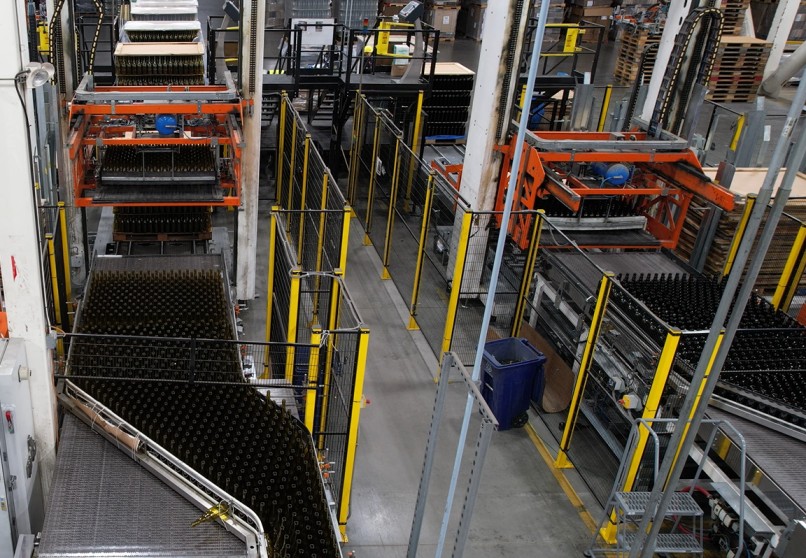
Manufacturing logistics is the system that keeps production moving, coordinating raw materials, parts, and finished goods so nothing slows down on the factory floor. When even one shipment is late or inventory is off by a few units, entire production schedules can be disrupted. That’s why logistics is one of the most critical functions for manufacturers.
For more than 100 years, Buske Logistics has helped leading manufacturers manage these complexities with end-to-end 3PL solutions. From inbound transportation and warehousing to on-site logistics and just-in-time delivery, our team supports every stage of the supply chain.
With a North American network of strategically located facilities and deep expertise in manufacturing operations, we give our partners the confidence that their supply chains are efficient, resilient, and built to scale.
So what exactly does manufacturing logistics involve, and how does it differ from general logistics? Let’s break it down.
Manufacturing logistics refers to the coordination and movement of materials, parts, and products throughout the entire production cycle. Unlike general logistics, which focuses on the broader transportation and storage of goods, manufacturing logistics is tailored specifically to the needs of manufacturers. It ensures that raw materials arrive on time, work-in-process items flow smoothly between stages, and finished products are distributed efficiently to customers or downstream partners.
Core components of manufacturing logistics include:
When executed effectively, manufacturing logistics keeps supply chains lean, responsive, and cost-effective, helping manufacturers meet tight production schedules without excess inventory or delays.
Even the most established manufacturers face ongoing challenges in keeping their supply chains efficient and resilient. Unlike standard distribution models, manufacturing logistics requires precision and real-time responsiveness. Some of the most common hurdles include:
Third-party logistics (3PL) providers play a vital role in helping manufacturers overcome the complexity of today’s supply chains. By leveraging advanced technology, scalable infrastructure, and specialized expertise, 3PLs provide solutions that address the most pressing logistics challenges.
For more than a century, Buske Logistics has partnered with manufacturers across industries to design and execute supply chain strategies that drive efficiency and growth. Our experience in manufacturing logistics goes beyond standard warehousing and transportation and we embed ourselves as part of your operation.
By combining scale, flexibility, and deep industry knowledge, Buske stands out as the manufacturing logistics provider that helps manufacturers meet today’s challenges with confidence.
To keep production lines moving and supply chains running smoothly, manufacturers need more than basic transportation and storage. Buske Logistics provides a full suite of services designed specifically for manufacturing logistics:
These services work together to create an agile, end-to-end logistics system that helps manufacturers meet production timelines, reduce costs, and stay competitive.
Selecting the right logistics provider can make or break a manufacturer’s ability to scale and stay competitive. A strong partner should demonstrate proven expertise in manufacturing supply chains and the flexibility to adapt as your business grows.
Key factors to consider include:
By weighing these factors, manufacturers can ensure they partner with a logistics provider capable of supporting both current needs and long-term strategic goals.
What is manufacturing logistics?
Manufacturing logistics is the management of materials, components, and finished goods across the production cycle. It covers inbound transportation, work-in-process handling, warehousing, and final distribution.
How does a 3PL support manufacturing companies?
A 3PL streamlines logistics for manufacturers by providing warehousing, transportation, inventory visibility, and on-site logistics. This helps reduce costs, improve efficiency, and keep production on schedule.
What are the benefits of outsourcing logistics for manufacturers?
Outsourcing logistics gives manufacturers access to scalable infrastructure, advanced technology, and experienced labor. It reduces overhead while improving supply chain speed, flexibility, and accuracy.
What are common challenges in manufacturing logistics?
Manufacturers often face labor shortages, inventory inaccuracies, delayed deliveries, just-in-time (JIT) pressures, and capacity planning difficulties.
What services are included in manufacturing logistics?
Services include inbound transportation, warehousing for manufacturers, on-site logistics, finished goods distribution, and vendor-managed inventory (VMI).
How do manufacturers choose the right logistics partner?
They should evaluate industry experience, scalability, proven warehousing and transportation performance, and the provider’s technology for visibility and control.
What’s the difference between manufacturing logistics and general logistics?
General logistics focuses on broad goods movement, while manufacturing logistics is tailored to production, ensuring raw materials, components, and finished products flow seamlessly through the supply chain.
Manufacturing logistics is more than moving goods and it’s the critical link that keeps production lines running, customers satisfied, and businesses competitive. By outsourcing to a trusted 3PL, manufacturers can overcome challenges like labor shortages, JIT requirements, and capacity constraints while gaining the flexibility to grow.
Buske Logistics has spent over a century helping manufacturers scale, reduce costs, and meet tight production schedules through warehousing, transportation, and on-site logistics solutions. With our North American network and industry expertise, we deliver the reliability and agility modern supply chains demand.
Looking for a reliable 3PL partner for your manufacturing operations? Explore our solutions for manufacturers.